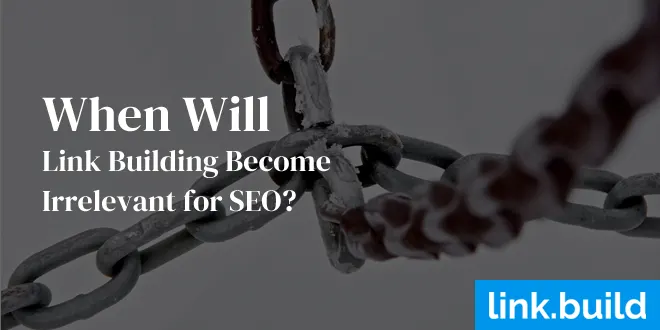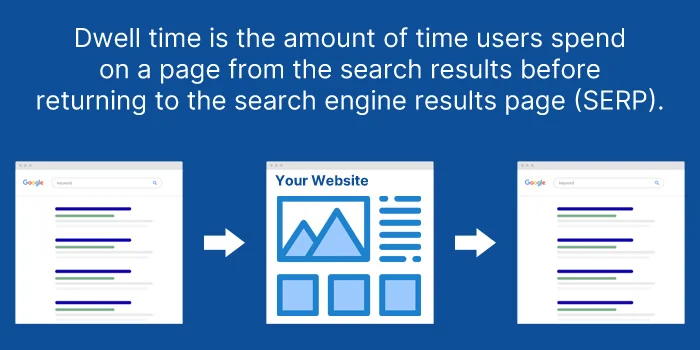When Will Link Building Become Irrelevant for SEO?

Link building has been a pivotal aspect of search engine optimization (SEO) for decades.
It encompasses the acquisition of backlinks from other websites, which can improve a site's visibility and domain authority.
However, as search algorithms continue to evolve and new technologies emerge, it is becoming increasingly uncertain when building links will become irrelevant for SEO.
The answer to this question is complex and multifaceted, as it depends on various factors.
Nonetheless, we can scrutinize some of the trends in the SEO industry and make predictions regarding the future of link building.
User Metrics: Dwell Time & Bounce Rates

Search engine optimization (SEO) has traditionally relied on a myriad of metrics, such as backlinks, to ascertain search intent and rank websites accordingly. However, as search algorithms become more sophisticated, it is becoming increasingly evident that user behavior metrics, such as bounce rates and dwell time, are acquiring greater prominence in determining search intent.
Bounce rates pertain to the percentage of users who leave a website after viewing only one page. Elevated bounce rates signify that users did not find what they were seeking and promptly left the site. Conversely, dwell time measures how long users remain on a website. Prolonged dwell times indicate that users found the content compelling and germane.
Search engines are increasingly leveraging bounce rates and dwell time as barometers to gauge the quality and relevance of a website's content. If a website has a high bounce rate, it is likely that users did not find what they were searching for, and the website may be ranked lower in search results. Similarly, if a website has a low dwell time, it may signify that users did not find the content engrossing, and the website's ranking may suffer.
These user behavior metrics are assuming greater importance in determining search intent because they provide search engines with valuable insights into how users engage with websites. High authority links may indicate that the website has relevance in a particular topic, but they do not necessarily reflect how users perceive the content.
Bounce rates and dwell time, on the other hand, furnish a direct measure of user satisfaction and engagement. If users swiftly depart from a website or do not stay on the site for long, it is a conspicuous signal that the content is not meeting their needs or expectations. This information can help other search engines modify their rankings to better reflect what users are seeking.
Artificial Intelligence
One trend that is expected to have a momentous impact on link building campaigns is the ascendance of artificial intelligence (AI). AI algorithms are becoming increasingly sophisticated and are increasingly being used to analyze and rank websites. As AI becomes more pervasive, it may be capable of identifying and prioritizing quality content more effectively than link metrics.
For instance, instead of relying on the number of backlinks, AI algorithms could scrutinize the quality of the content on a website, how frequently it is updated, and how well it matches user intent. This could imply that link building becomes less important in the future, as search engines rely more on content relevance and user experience.
Furthermore, as artificial intelligence (AI) algorithms become more ubiquitous in search engines, they are better equipped to analyze user behavior metrics and leverage them to determine search intent. AI algorithms can discern patterns in user behavior and tweak rankings accordingly, providing more accurate and relevant search results.
Social Media Signals
Another trend that could affect link building is the burgeoning significance of social media. Social media platforms are already a substantial source of referral traffic for numerous websites, and this trend is likely to persist. As social media becomes more intertwined with search algorithms, it may become a more decisive factor in ranking websites.
If social media becomes a more significant aspect of SEO, link building may become less important. Instead of focusing on acquiring backlinks, businesses may need to invest more in social media marketing and augmenting their social media presence.
Avoiding Spam Backlinks

Finally, the perpetual changes to search algorithms, such as Google's recent core updates, could also impact the relevance of link building. Google has been making efforts to enhance the quality of its search results and penalize sites that use spammy or manipulative link building tactics.
This is only one reason you have to be careful in the types of services and companies you engage in link building services.
If search engines persist in prioritizing quality over quantity concerning backlinks, link building may become less relevant in the future. Instead, businesses may need to focus on creating high-quality content that naturally attracts backlinks from other websites.
Avoiding common link building mistakes, such as acquiring irrelevant links from low quality sites or multiple websites with low relevance links, is essential to maintaining a healthy link profile. Building links from irrelevant websites or such sites will only harm your long-term SEO efforts.
Conclusion
In conclusion, it is arduous to predict when effective link building strategies will become irrelevant for SEO. However, various trends in the industry imply that it could occur in the future. As AI algorithms become more prevalent, social media becomes more integrated with search algorithms, and search engines prioritize quality over quantity concerning backlinks, businesses may need to shift their focus away from link building and towards creating high-quality content and augmenting their social media presence.
As search algorithms become more sophisticated and AI becomes more prevalent, user behavior metrics will become an even more crucial barometer in determining search intent.
Hence, businesses should focus on crafting captivating and pertinent content that satisfies the needs and expectations of their target audience to enhance their bounce rates and dwell time and, ultimately, their search engine rankings.


.svg)


.jpg)
.jpg)